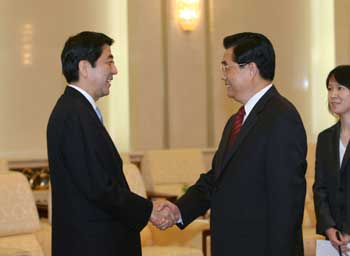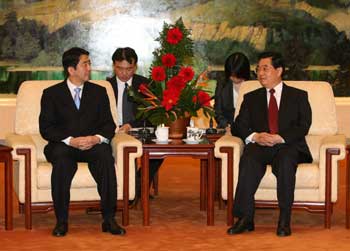Chinese President Hu Jintao met with Japanese Prime
Minister Shinzo Abe in the Great Hall of the People Sunday afternoon, soon after
Abe's talks with Premier Wen Jiabao.
Gist of Japan-China joint press
statement

Chinese President Hu Jintao (R)
shakes hands with Japanese Prime Minister Shinzo Abe during their meeting
in Beijing, capital of China, Oct. 8, 2006.
[Xinhua] |
"Your ongoing visit is serving as a
turning point in the China-Japan relations and I hope it would also serve as a
new starting point for the improvement and development of bilateral ties," Hu
told Abe, congratulating upon Abe's taking office as prime minister.
Hu spoke highly of Abe's choosing China as the destination of his first
official overseas trip, saying it indicated Abe has attached great importance to
the improvement and development of the relations between the two neighbors.

Chinese President Hu Jintao (R)
talks with Japanese Prime Minister Shinzo Abe in Beijing, capital of
China, Oct. 8, 2006. [Xinhua] |
Shortly
afterwards, top legislator Wu Bangguo met with Abe, who arrived in
Beijing earlier Sunday and will fly to Seoul early Monday.
Wu, chairman of the Standing Committee of the National People's Congress,
said Abe's ongoing visit attracted world attention, especially from the Japanese
and Chinese people.
"I hope the stalemate in China-Japan relations come to an end and I believe
this visit would help open up a new page for bilateral ties," Wu said.
Abe told Wu that his visit indicated both Japan and China are attaching
"extreme importance" to bilateral relationship.
A senior Japanese official, speaking in Beijing ahead of Abe's trip, said it
was "quite natural" that North Korea will figure in Abe's meetings. Abe is
supposed to discuss the Korean peninsula nuclear issue with Chinese top leaders,
in order to push forward the stranded six-party talks for an early resumption,
sources said.
"Mr Abe thinks the international community must come together in putting
pressure on North Korea so that North Korea would refrain from implementing a
nuclear test in the future," the official said.
Abe's visit is meant to ease years of deteriorating ties between Asia's
biggest economies. Abe is the first Japanese leader to visit Beijing since 2001.
The trip carries deep symbolism as it will be the first foreign trip for Abe,
who was long seen as a hardliner toward Asian neighbors. Japanese premiers have
traditionally gone first to the United States.
Xu Dunxin, who was Chinese ambassador to Japan between 1993 and 1998, was
"prudently optimistic" about the prospects of China-Japan relations, saying
"Abe's visit cannot resolve all the problems in bilateral ties as they are
complicated and protracted."
But Abe's visit will open a channel for top leaders of the two countries to
communicate and exchange views, and lay groundwork for further discussions, Xu
said.
"The visit itself is a positive result," he added.
Premier Wen invited Abe to visit China on the premise that "China and Japan
reached a consensus on overcoming the political obstacle affecting bilateral
relationship and promoting friendly and cooperative relationship," said Foreign
Ministry spokesman Liu Jianchao.
Abe, who took office September 26, is the first Japanese postwar prime
minister who chose China as the destination of his first official overseas trip.
He is also the first Japanese leader visiting China in five years as top-level
visits had been halted because of his predecessor Junichiro Koizumi's repeated
visits to the Yasukuni Shrine, where 14 class-A war criminals in WWII are
honored along with Japan's war dead.
While speaking of his visit to China and the ROK, Abe told a session of the
House of Representatives Budget Committee on Thursday that frank exchanges of
views, goals and ideals are the first step in building the "relations of trust"
among the Asian neighbors.
Abe, who took office Sept. 26, is the first Japanese postwar prime minister
who chose China as the destination of his first official overseas trip. It's
also the first visit to China by a Japanese prime minister in five
years.